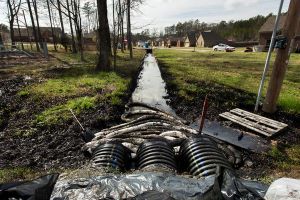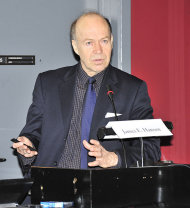 UPDATE: Correction: We originally reported that Exxon had allegedly pumped diluted bitumen which spilled into the Northwood Subdivision into a nearby wetland. We were mistaken; they power washed it into the nearby wetland via storm drains.
UPDATE: Correction: We originally reported that Exxon had allegedly pumped diluted bitumen which spilled into the Northwood Subdivision into a nearby wetland. We were mistaken; they power washed it into the nearby wetland via storm drains.
Mayflower, AR, April 5: We spent most of the day chasing down reports of oil sightings and talking to residents.

 Environmental Glance
Environmental Glance The Federal Aviation Administration (FAA) has had a "no fly zone" in place in Mayflower, Arkansas since April 1 at 2:12 PM and will be in place "until further notice," according to the FAA website and it's being overseen by ExxonMobil itself. In other words, any media or independent observers who want to witness the tar sands spill disaster have to ask Exxon's permission.
The Federal Aviation Administration (FAA) has had a "no fly zone" in place in Mayflower, Arkansas since April 1 at 2:12 PM and will be in place "until further notice," according to the FAA website and it's being overseen by ExxonMobil itself. In other words, any media or independent observers who want to witness the tar sands spill disaster have to ask Exxon's permission. James Hansen, an outspoken advocate for action on climate change, announced Monday that he is retiring after nearly 50 years as a climate scientist for NASA's Goddard Institute for Space Studies.
James Hansen, an outspoken advocate for action on climate change, announced Monday that he is retiring after nearly 50 years as a climate scientist for NASA's Goddard Institute for Space Studies. Climate change is expanding Antarctica's sea ice, according to a scientific study in the journal Nature Geoscience. The paradoxical phenomenon is thought to be caused by relatively cold plumes of fresh water derived from melting beneath the Antarctic ice shelves.
Climate change is expanding Antarctica's sea ice, according to a scientific study in the journal Nature Geoscience. The paradoxical phenomenon is thought to be caused by relatively cold plumes of fresh water derived from melting beneath the Antarctic ice shelves.






























